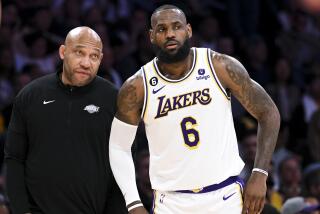Time for Balanced Budget Amendment
- Share via
This should be a golden hour for the NHL. It has addressed on-ice problems with rule changes that have increased scoring, and it has had a chance to grab media attention and win fans while locked-out NBA players plead poverty.
Instead, general managers say the league’s horizon is tinged with red ink, raising the specter of problems they fear will leave a chasm between rich teams and their poor cousins.
To meet today’s payroll, the Pittsburgh Penguins--who needed loans from owner Roger Marino and cash from a trade to meet previous payrolls--had to renegotiate fees on a $20-million loan from a French bank to get a bankruptcy judge’s approval on the loan Monday. Last week, the league increased to $8 million the subsidies it will give to Ottawa, Edmonton and Calgary as part of its Canadian assistance plan.
The Kings have estimated they will lose $15 million this season. The Canucks claim to have lost $24 million the last two seasons. The Capitals lost $16 million last season despite going to the Stanley Cup finals, and will lose $20 million this season.
“It’s insane,” Washington General Manager George McPhee said.
Mighty Duck General Manager Pierre Gauthier said his club will lose “lots of money” for the first time in its history.
“It doesn’t add up anymore,” he said. “The balance of happiness is not correct. We’re paying players too much for our revenues.
“There are three parties to be kept happy--players, owners and fans. The product is better. We’ve adjusted. There’s good news in that area. And TV is better. But we’re at the limit on ticket prices, so fans aren’t happy. You don’t see families at games anymore.
“Owners are losing huge amounts of money, and we have franchises that are in trouble, so owners aren’t happy.
Only the players are happy. The players are too happy for what the fans are getting and what the owners are getting.”
McPhee said he can’t make trades that would raise his $31-million payroll, and he must cut his budget next season.
“Look at all the players that are on waivers on one-way salaries that you could have for nothing,” he said. “Nobody is taking them. I honestly believe it’s gotten to the point where only a few teams can afford to make moves.”
According to Boston Bruin General Manager Harry Sinden, clubs pay 72% of their revenues to players. The NBA, which has greater TV and merchandising income, last season paid 57% of its revenues to players--and considered that high enough to initiate a lockout.
“We’ve got problems,” Sinden told the Boston Globe. “We have a long time to go on this collective bargaining agreement [September 2004] and we probably don’t have any relief in sight except our own resolve.”
Gauthier believes teams have overpaid older, unrestricted free agents and restricted free agents such as Chris Gratton, who’s getting $16.5 million for five years from Tampa Bay. McPhee assigned an aide to research players’ performances the seasons before and after they signed mega-deals, and initial numbers showed big drop-offs under the new contracts.
“They have a big year, they hit the lottery, and they they settle back,” McPhee said.
Said Gauthier, “Fans have to realize money doesn’t necessarily buy winning in hockey. It’s been proven. Look at the standings and look at payrolls. Boston, Ottawa, Buffalo and Edmonton, in pay versus performance, spent the least money for the points they got. . . . [The Penguins] are an example of what we’re afraid could happen if we don’t control spending. There are two scenarios: We start losing teams. Teams go bankrupt like Pittsburgh. The other is we lose what is probably the biggest strength of our sport, the competitive balance. The worry is, what happens if good players go to the teams that have money.”
OTHER SIDE OF THE LEDGER
To Bob Goodenow, executive director of the NHL Players Assn., all is not so dark. He cited the rising value of franchises and said salaries and ticket prices aren’t absolutely linked, as owners claim.
“Owners have to do things that make business sense, and if it doesn’t make sense they’ve got to change the way they operate,” he said. “I believe players’ salaries reflect the value of the business they operate. We’ve seen teams develop [revenue sources] to help them operate.”
He also said the Penguins are an isolated case.
“It’s a very serious situation, indeed, unfortunate, and now very complicated because of the bankruptcy issues,” he said. “Hopefully, all their affairs can be put in order.
“I would say Pittsburgh’s bankruptcy stems from a host of issues dating back as far as the lockout [in 1994-95] and their arena lease and revenues. It’s a unique situation. And if not, we’ll handle it.”
LEGION OF DOOM: THE SEQUEL
When talks broke down between Toronto and Tampa Bay over AWOL Maple Leaf goalie Felix Potvin, the Lightning wasted no time in trading Mikael Renberg back to the Flyers with center Daymond Langkow for Chris Gratton and throw-in Mike Sillinger. The Flyers reunited the Renberg-Eric Lindros-John LeClair line and have depth on the wing, with previous pickup Keith Jones.
It’s Flyer General Manager Bob Clarke’s way of saying he goofed in signing Gratton as a restricted free agent. Clarke had to pay four first-round draft picks as compensation but sent Renberg and Karl Dykhuis to the Lightning to reacquire the picks.
Gratton earned $10 million last season, when the Flyers flopped in the first round of the playoffs, and was collecting $1.5 million this season for scoring one goal and compiling a minus-eight plus-minus rating. However, he wasn’t playing his natural center position and will get more time there with the Lightning. If he responds, the Lightning will have a promising 1-2 punch at center with Gratton, 25, and 1998 top draft pick Vincent Lecavalier.
GOALIES REALLY ARE WEIRD
Hockey lore is studded with anecdotes about goalies being a little odd, and Buffalo’s Dominik Hasek adds to it. His uniqueness extends beyond his unorthodox style to some unorthodox habits.
“I don’t know why, but I am not afraid to stop the puck with my head,” he said. “I try to do it sometimes even in practice. Not every day, but once in a while, I say to my teammates, ‘Shoot me in my head and I’ll try to stop the puck.’ ”
DEVILISHLY GOOD
Robbie Ftorek has opened the floodgates for the New Jersey Devil offense.
Freed from Jacques Lemaire’s defensive shackles, the Devils are scoring in bunches. They’re averaging 4.29 goals a game in their 5-0-2 streak and they’re getting production from Bobby Holik, who has seven goals in the streak, and Dave Andreychuk, who has four. “We can come back on teams because we can score goals,” Andreychuk said.
They’ve sacrificed a bit defensively, but their special teams play is solid and Martin Brodeur has come up big when needed. Kudos to Ftorek, who allows players to capitalize on their individual strengths within a solid system.
OLIE THE BELEAGUERED GOALIE
Injuries have so drastically depleted the Capital offense that goalie Olaf Kolzig figures he must be perfect to win.
“I let in one goal, so I can improve,” he said after giving up a power-play goal in a 1-0 loss to the Ducks on Friday. “My job is maybe to get a shutout here or there. I haven’t gotten a shutout since Game 6.”
Talk about self-imposed pressure. But he’s right, because the defending Eastern Conference champions are tied with San Jose for the fewest goals scored, 57. “We had a good preseason and at the start of the year, guys were very positive,” center Joe Juneau said. “But we got a lot of injuries and since then, we haven’t been the same team.”
SLAP SHOTS
The Ice Dogs’ Patrik Stefan, the 18-year-old Czech considered a top prospect in the 1999 NHL draft, was told to rest for two months after suffering head and neck injuries in a game against Houston on Nov. 27. . . . The IHL will name its comeback-player-of-the year award after John Cullen, the Tampa Bay center who made a remarkable comeback from non-Hodgkin’s lymphoma and a bone-marrow transplant. He recently retired and is a Lightning assistant coach. A $1,000 donation will be made to a charity in the winner’s name. . . . The Phoenix Coyotes are drawing plans for an arena-entertainment complex in suburban Scottsdale. They say they plan to build it without increasing taxes locally.
The Buffalo Sabres may be ready to deal the rights to restricted free-agent right wing Donald Audette--but not to the Kings for Olli Jokinen, as a rumor out of Buffalo had it. “You can quash that one,” King General Manager Dave Taylor said. . . . The Islanders, tired of waiting for the Canucks to trade Pavel Bure, are looking at Calgary’s Theo Fleury. The fiery right wing, who can become a walkaway free agent July 1, denied reports that he rejected a $5-million annual salary from the Flames. The Islanders also talked to Florida about a top-four defenseman--they like Robert Svehla--and rookie winger Oleg Kvasha for defenseman Bryan Berard. Something may break before the NHL’s Christmas trade moratorium, which begins Saturday and runs through Dec. 27. . . . The Avalanche renewed talks with Paul Theofanous, who represents unsigned restricted free agent Sandis Ozolinsh. The sides are about $700,000 apart, so no deal is expected soon.
More to Read
Go beyond the scoreboard
Get the latest on L.A.'s teams in the daily Sports Report newsletter.
You may occasionally receive promotional content from the Los Angeles Times.







